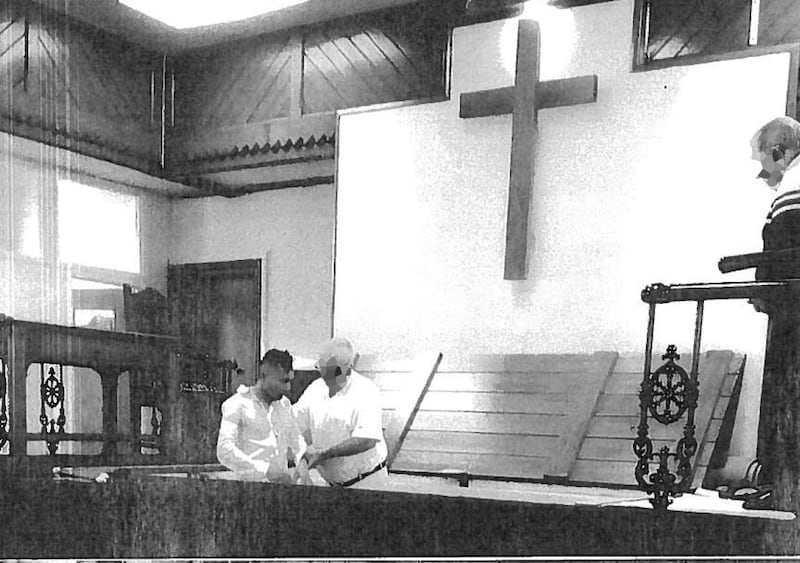James Cleverly has serious questions to answer about how Clapham chemical attacker Abdul Ezedi was allowed to remain in the UK, Labour has said.
Shadow home secretary Yvette Cooper said her counterpart needs to explain why the sex offender was able to remain in the country two years after his first asylum claim was rejected.
Ezedi was granted asylum by a judge who accepted he was a Christian convert despite concerns that he was a liar, a raft of previously confidential court documents have shown.
Home Office sources warned that the reputation of Christian churches could be damaged if they are viewed as undermining the integrity of the asylum system.
It comes as the BBC reported Ezedi’s funeral took place at a mosque in west London earlier this month and he was given a Muslim burial at a cemetery in east London, with the request for the Islamic ceremony believed to have come from friends and family.
Ezedi’s body was pulled from the River Thames last month following a major manhunt launched after he was suspected of dousing his ex-girlfriend with alkali when he pounced on her and her children, aged eight and three, in Clapham, south London, in January.
The case has sparked widespread debate about the role religion plays in determining asylum claims, while also raising questions over how the Government and courts scrutinise the validity of evidence presented in applications.

Labour frontbencher Ms Cooper said: “The latest disturbing revelations about the Abdul Ezedi case raise some serious and urgent questions for the Home Office.
“The Home Secretary must explain why his department failed to remove Ezedi from the UK in the two years after his first asylum claim was rejected – particularly after he was convicted of sexual offences.”
The Home Office said it would not comment on individual cases.
According to officials, deportations cannot be carried out when there is an ongoing criminal prosecution, suggesting this is the reason why Ezedi was not removed from the country after his first failed asylum claim and before his court sentence.
But questions remain as to why he was not then removed after his conviction, and before he lodged his second asylum appeal. Although typically only foreign nationals jailed for more than a year are eligible for removal.
Rarely-made-public immigration tribunal court papers showed the lengths the Afghan national went to evidence his religious conversion from Islam, and how some of those who supported him during the process were aware of his crimes.
He even had an agreement to be effectively escorted during church services as a result of his conviction.
Ezedi arrived in the UK in January 2016, but his initial asylum claim was rejected by the Home Office, as was an appeal in 2017.
In January 2018, he was placed on the sex offender register for 10 years and ordered to carry out 200 hours of unpaid work after pleading guilty to charges of sexual assault and exposure.
Just over a year later, in March 2019, he made an appeal over his asylum claim with the First-tier Tribunal (Immigration and Asylum Chamber), arguing that he feared persecution because of his religion.
His lawyers argued he had converted from Shia Islam to Baptist Christianity.
A judge accepted this and allowed his appeal in November 2020, despite doubts from the Home Office about his conversion being “genuine and long-lasting”.
Ms Cooper said the attacker should have been “an urgent priority for removal in 2018″ after his conviction.
She added: “We need to know how many other similar cases there might be, whether the Home Office is failing to recognise the urgency of dealing with sex offence cases, and what went so badly wrong in this appalling case.”

Meanwhile, a minister has claimed that the Government’s Safety of Rwanda (Asylum and Immigration) Bill will help to prevent future cases similar to that of Ezedi once it becomes law.
The Bill is currently caught in a legislative tussle between the House of Commons and House of Lords over concerns about human rights and judicial oversight.
Science minister Andrew Griffith told Sky News: “We can’t run an asylum system based on credulous clerics and lefty lawyers. That is why we are fundamentally reforming it.”
Mr Griffith said the proposed law would “apply to this case, as it would many other cases that people are concerned about”.
He added: “That is the law that we are trying to get through the House of Lords right now.
“We are a couple of busloads of peers away in terms of the votes to be able to get that through the House of Lords and then that will create the system that we want, that would have prevented this tragic case.”









